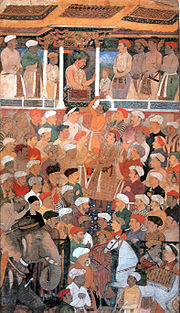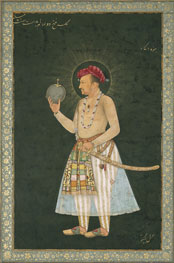
Tuzk-e-Jahangiri
Encyclopedia

Jahangir
Jahangir was the ruler of the Mughal Empire from 1605 until his death. The name Jahangir is from Persian جهانگیر,meaning "Conqueror of the World"...
(1569-1609). Also referred to as Jahangirnama , Tuzk-e-Jahangiri is written in Persian
Persian language
Persian is an Iranian language within the Indo-Iranian branch of the Indo-European languages. It is primarily spoken in Iran, Afghanistan, Tajikistan and countries which historically came under Persian influence...
, and follows the tradition of his great-grandfather, Babur
Babur
Babur was a Muslim conqueror from Central Asia who, following a series of setbacks, finally succeeded in laying the basis for the Mughal dynasty of South Asia. He was a direct descendant of Timur through his father, and a descendant also of Genghis Khan through his mother...
(1487-1530), who had written the Baburnama
Baburnama
Bāburnāma is the name given to the memoirs of Ẓahīr ud-Dīn Muḥammad Bābur , founder of the Mughal Empire and a great-great-great-grandson of Timur...
; though Jahangir went a step further and besides the history of his reign, he includes details like his reflections on art, politics, and also information about his family.
The writer
Jahangir was a good writer and loved nature. Jahangir recorded detailed description about wildlife in his autobiography. Jahangir admired paintings and collected them in his palace. Many of them survived and are found in museums around the world.Overview

Akbarnama
The ' , which literally means Book of Akbar, is the official chronicle of the reign of Akbar, the third Mughal Emperor , commissioned by Akbar himself and written in Persian by his court historian and biographer, Abul Fazl who was one of the nine jewels in Akbar's court...
. First important printed version of 'Jahangirnama', was by, Sayyid Ahmad printed at Ghazipur in 1863 and at Aligarh in 1864
Jahangir’s autobiography also reflects the royal ideology of Jahangir’s views on various political, religious and social issues. Within the memoir, he noted many of his local level legislative policies in his large empire consisting of all of modern day India. Among them were his decrees to manage and regulate the jagirdars. Jagirdars were holders of the jagir
Jagir
In historic India, a jagir was a small territory granted by the ruler to an army chieftain in fairly short terms usually of three years but not extending beyond his lifetime, in recognition of his military service...
, the emperor’s land grant title. The jagirdars were to take the income of the land and use it mainly to finance the maintenance of the troops and to address the town needs. Jahangir made various attempts to halt corruption within the jagirdars. He prohibited each of them from using the money for personal profit by ordering that part of the land income to go to hospitals and infirmaries and for each town to be equipped with religious buildings according to the religion of that area. Jahangir also kept the jagirdars from gaining interest in family or land riches by ordering for jagirdars to seek his approval before marrying someone from the town they ruled in.
Further reading
- The Tūzuk-i-Jahangīrī Or Memoirs Of Jahāngīr, Alexander Rogers and Henry BeveridgeHenry BeveridgeHenry Beveridge was an Indian Civil Service officer and Orientalist in British India. He is one the few administrator-historians who studied Indian affairs with a radical outlook....
. London, Royal Asiatic Society, 1909–1914. - The Jahangirnama: Memoirs of Jahangir, Emperor of India by Jahangir, tr. Wheeler M. Thackston. Oxford University PressOxford University PressOxford University Press is the largest university press in the world. It is a department of the University of Oxford and is governed by a group of 15 academics appointed by the Vice-Chancellor known as the Delegates of the Press. They are headed by the Secretary to the Delegates, who serves as...
, 1999. ISBN 0195127188.

